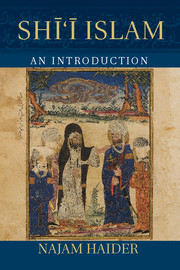Book contents
- Frontmatter
- Dedication
- Contents
- List of Tables and Maps
- Acknowledgments
- Note on the Cover Image
- A Note on Transliteration and Dating
- Maps
- Introduction
- Section 1 Theology
- Section 2 Origins
- Section 3 Constructing Shī‘ism
- Section 4 Shī‘ism in the Modern World
- 8 Zaydism at the Crossroads
- 9 (Nizārī) Ismā‘īlism Reconstituted
- 10 The Politicization of the Twelver Shī‘a
- Conclusion Sunnī–Shī‘ī Relations
- Appendix Verses Mentioned in the Argument from Qur’ānic Expectations in Chapter 3
- Index
- References
10 - The Politicization of the Twelver Shī‘a
Published online by Cambridge University Press: 05 August 2014
- Frontmatter
- Dedication
- Contents
- List of Tables and Maps
- Acknowledgments
- Note on the Cover Image
- A Note on Transliteration and Dating
- Maps
- Introduction
- Section 1 Theology
- Section 2 Origins
- Section 3 Constructing Shī‘ism
- Section 4 Shī‘ism in the Modern World
- 8 Zaydism at the Crossroads
- 9 (Nizārī) Ismā‘īlism Reconstituted
- 10 The Politicization of the Twelver Shī‘a
- Conclusion Sunnī–Shī‘ī Relations
- Appendix Verses Mentioned in the Argument from Qur’ānic Expectations in Chapter 3
- Index
- References
Summary
The contemporary Twelver Shī‘ī community is characterized by a politicized outlook that contrasts sharply with its tradition of quietism and disengagement. There is a risk of delving too deeply into the intricacies of political history when discussing modern Twelver Shī‘ism. An adequate study of Hezbollah (the Party of God), for example, would require a detailed investigation of the local power structures, history, and demographics of Lebanon. Such an analysis lies outside the scope of this book, but resources are provided at the end of the chapter for readers interested in the Shī‘ī communities of Iran, Iraq, and Lebanon. The current chapter examines two topics that embody the politicization of Twelver Shī‘ism. The first involves changes in the seminal narrative of Ḥusayn's martyrdom in Karbala as represented in the speeches and writings of Ali Shariati (d. 1977). The second focuses on the political career and written works of Ayatollah Ruhollah Khomeini (d. 1989).
Ali Shariati's Red Shī‘ism
Chapter 3 documented the evolution of ‘Āshūrā’ commemorations in Twelver Shī‘ism beginning in the eighth century and extending through the Safavid and Qajar periods. Both the Safavids and the Qajars promoted a narrative permeated with supernatural elements to evoke emotional responses in an audience. Ḥusayn Va‘iẓ Kāshifī (d. 1504) recorded the first and most influential of such narratives in his Rawżat al-shuhadā (The Garden of the Martyrs), a work written in Persian and interspersed with Qur’ānic passages and poetry. Kāshifī structured his account in historical terms beginning with Adam and then proceeding through the Prophets and the Imāms. Each of these figures had experienced varying degrees of suffering as a result of oppression and tyranny. The events at Karbala were the natural culmination of an established historical pattern.
- Type
- Chapter
- Information
- Shi'i IslamAn Introduction, pp. 200 - 217Publisher: Cambridge University PressPrint publication year: 2014



